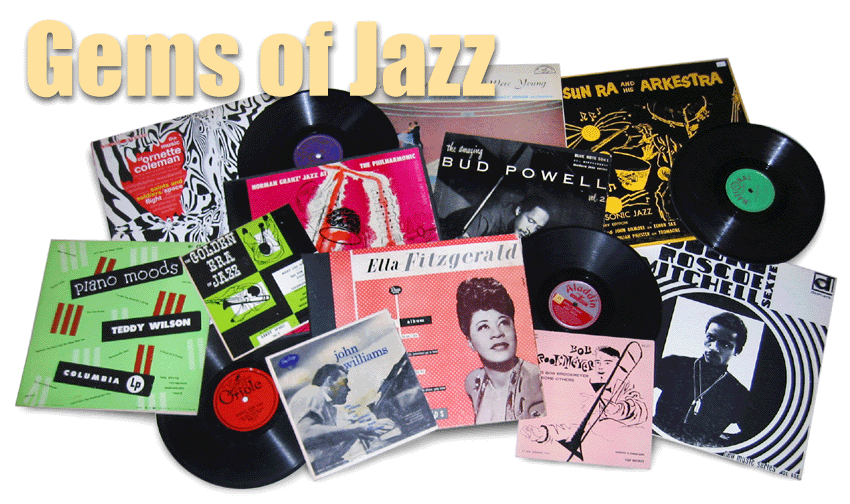Here's another sampling of from one those "other JATP concerts." It comes from two Gene Norman "Just Jazz" shows at the Pasadena Civic Auditorium and the Shrine Auditorium, one from April and the other from December of 1947. These selections – three of them, actually – feature the immortal Wardell Gray, one of my favorite tenor players and I assume one of yours, too.
Wardell's on stage with the gents above plus Vic Dickenson, Benny Carter, Jackie Mills and Vido Musso for several of these tunes, but the showstopper is a feature for the tenorist with Erroll Garner at the keyboard on "Blue Lou." Gray's superb tone and cool control are on display throughout the six minute performance and his ease with melody and improvisation evoke Lester Young in modernist guise. According to a very informative Wardell Gray website, Benny Goodman heard "Blue Lou" and was impressed enough to hire Gray for his band, saying, "If he's bop, that's great. He's wonderful!"
 |
| Benny and sideman Wardell in 1948 or '49. |
It's unfortunate that Wardell died in Las Vegas in 1955 just as the technology was shifting away from the 3-minute, 78-rpm format to long-playing microgroove records. One would have liked to hear him stretch out in the studio as he does on these concert recordings. As it was, he died mysteriously, either by accident or at the hands of gangsters, several months after his former employer, Charlie Parker, expired in Baroness Nica's New York apartment. Both Bird and Wardell were 34 at the time.
So here is some first-rate Wardell Gray, accompanied by several other giants of the music. The great Benny Carter is on alto, as fluid and suave as ever, and Howard McGhee crackles on trumpet, hitting all the highs and bursting with ideas. There's the Elf, too, Errol Garner, comping along and soloing in his distinctive style. "Tenderly" is all his, one of the very few times he ever recorded that tune, believe it or not. His performance sounds to my ears like a studio recording as no crowd is audible and it's a solo spot, but the authorities say it came from the Civic concert stage so I won't quibble. This record, by the way, is another from that cache that was found in an attic by my friend who cleans out houses for a living. That's why it's got the number "58" on it – all those sides were numbered for some reason by their original owner.
The download comes from the original vinyl, as always, and required no cleaning of the sound at all.
Way Out Wardell
Wardell Gray
Crown CLP 5004
Wardell Gray, ts; Errol Garner, p; Irving Ashby, g; George “Red” Callender, b; Jackie Mills, d.
Just Jazz Concert, Civic Auditorium, Pasadena, CA; April 29, 1947
1. Blue Lou
Howard McGhee, tp; Wardell Gray, Vido Musso, tp; Arnold Ross, p; Barney Kessel, g; Harry Babasin, b; Don Lamond, d.
Just Jazz Concert, Shrine Auditorium, Los Angeles, CA; December 27, 1947
2. Just You, Just Me
Howard McGhee, tp; Vic Dickenson, tbn; Benny Carter, as; Wardell Gray, ts; Errol Garner, p; Irving Ashby, g; George “Red” Callender or Charles Drayton, b; Jackie Mills, d.
Just Jazz Concert, Civic Auditorium, Pasadena, CA; April 29, 1947
3. One O'Clock Jump
Errol Garner, p.
Just Jazz Concert, Civic Auditorium, Pasadena, CA; April 29, 1947
4. Tenderly
Find it here: https://www.mediafire.com/?ykwwook9nwtp0kg











